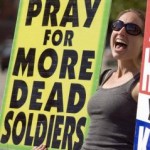Veterans Day occurred yesterday in the U.S. It’s a federal holiday for the recognition of all veterans and coincides with the international recognition of Remembrance Armistice Day at the end of World War I. I thought it would be appropriate to follow a day of recognition of what soldiers did in the wars with a few articles about what they do after. Troops returning home may mark a technical cessation of hostilities, but there’s more to do to bind up the wounds of the conflict.
“After Assassinations, Basque Killers Explain” (NYT):
The encounter, one of about a dozen similar meetings in the past year pairing the family members of victims with convicted terrorists, was not initially part of a formal reconciliation program. The talks began, Basque officials say, as an idea proposed by terrorists housed in a local prison, men who had turned their backs on the Basque separatist movement in recent years. The prisoners thought it was the one thing they could offer the victims of their violence: a chance, perhaps, to talk things out, to understand a little of what the separatists were thinking, to hear their remorse…
The two men spoke for more than two and a half hours, each telling his life story. Mr. García found out that, in fact, it was hard to look someone in the eyes and shoot him. In one case, the terrorist said, it was that look that had saved someone’s life. But Mr. García also found out that ETA assassins usually knew nothing about their targets. They were simply given photographs and told to kill at a certain hour. At first the job was taxing. But then killing became routine, the terrorist told him. For Mr. García, the most emotional moment was when the terrorist, now in a work-release program, said he was sorry. Mr. García said he saw that the man was profoundly ashamed for what he had done.
“That was tremendous for me,” Mr. García said. “I said I accepted his apology. But I said he needed to talk to the families he had hurt, and I told him he was, well, brave.”
“Eric Lomax, World War II Prisoner Who Forgave, Dies at 93” (NYT)
Mr. Lomax was repeatedly beaten and interrogated after his captors found a radio receiver he had made from spare parts. Multiple bones were broken and water was poured into his nose and mouth. One of his constant torturers stood out: Nagase Takashi, an interpreter…
The men finally met [again] in 1993, after Mr. Lomax had read an article about Mr. Nagase’s being devastated by guilt over his treatment of one particular British soldier. Mr. Lomax realized that he was that soldier.
“When we met, Nagase greeted me with a formal bow,” Mr. Lomax said on the Web site of the Forgiveness Project, a British group that seeks to bring together victims and perpetrators of crimes. “I took his hand and said in Japanese, ‘Good morning, Mr. Nagase, how are you?’ He was trembling and crying, and he said over and over again: ‘I am so sorry, so very sorry.’ ”
Mr. Lomax continued: “I had come with no sympathy for this man, and yet Nagase, through his complete humility, turned this around. In the days that followed we spent a lot of time together, talking and laughing.” He added, “We promised to keep in touch and have remained friends ever since.”
“Atonement: A troubled Iraq veteran seeks out the family he harmed” (New Yorker, paywall)
“There is not a day or a week that goes by that I don’t think about what we went through,” Lobello said. He seemed to be posing a kind of equivalence between him and his victims. If this was self-serving, there was also an undeniable truth to it: of all the people in the world, no one else could better understand what had happened.
…In the Bible, Numbers 31 prescribes a purifying ritual for soldiers returned from war: a cleanse of fire and water. American culture has no such rituals. Instead, it has legal constructs, like the rules of engagement–printed on cards to fit in your wallet–that allow soldiers like the men in Lobello’s unit to feel that they have merely done what they should. They are absolved even before they come home.













